

Secrets have long slipped into State Department email. By KEN DILANIAN, AP Intelligence Writer WASHINGTON (AP) — During the 2012 attack on U.S. facilities in Benghazi, Libya, State Department officials in Washington were emailing one another with updates in real time.
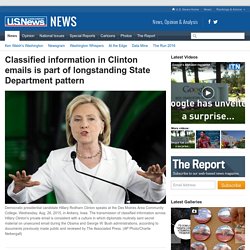
Embedded in those messages were nuggets of classified information, including an apparent reference to a CIA facility that was a closely guarded secret. When the emails were released last year under the Freedom of Information Act, that and other information found to be classified were censored from public view. Hillary Rodham Clinton is now under fire after revelations that material deemed classified was sent through the unsecure home server she was using as secretary of state for both official and private email, a matter that has become an issue in her front-running campaign for the Democratic presidential nomination. Records reviewed by The Associated Press make clear that the leakage of secrets onto unsecure email is a State Department problem dating to the George W.
Russ Tice. Career[edit] Tice worked as an intelligence analyst for the U.S.
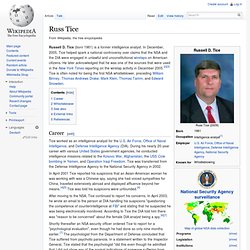
Air Force, Office of Naval Intelligence, and Defense Intelligence Agency (DIA). During his nearly 20-year career with various United States government agencies, he conducted intelligence missions related to the Kosovo War, Afghanistan, the USS Cole bombing in Yemen, and Operation Iraqi Freedom. Thomas Tamm. Thomas Tamm (born 1952) is a former attorney in the United States Department of Justice Office of Intelligence Policy and Review during the period in 2004 when senior Justice officials fought against the widening scope of warrantless NSA surveillance that consisted of eavesdropping on U.S. citizens.
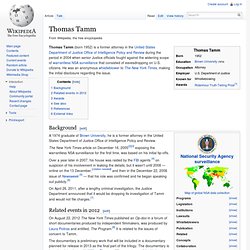
He was an anonymous whistleblower to The New York Times, making the initial disclosure regarding the issue. Edward Snowden. In 2013, Snowden was hired by an NSA contractor, Booz Allen Hamilton, after previous employment with Dell and the CIA.[4] On May 20, 2013, Snowden flew to Hong Kong after leaving his job at an NSA facility in Hawaii and in early June he revealed thousands of classified NSA documents to journalists Glenn Greenwald, Laura Poitras and Ewen MacAskill.
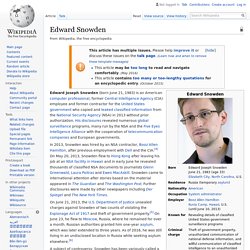
Snowden came to international attention after stories based on the material appeared in The Guardian and The Washington Post. Further disclosures were made by other newspapers including Der Spiegel and The New York Times. On June 21, 2013, the U.S. Department of Justice unsealed charges against Snowden of two counts of violating the Espionage Act of 1917 and theft of government property.[5] On June 23, he flew to Moscow, Russia, where he remained for over a month. Russian authorities granted him one-year asylum, which was later extended to three years. Background Childhood, family, and education Political views Career Employment at CIA Publication.
Glenn Greenwald Speaks Out. NSA whistleblower Edward Snowden: 'I don't want to live in a society that does these sort of things' Mark Klein. Mark Klein is a former AT&T technician who leaked knowledge of his company's cooperation with the United States National Security Agency in installing network hardware to monitor, capture and process American telecommunications.
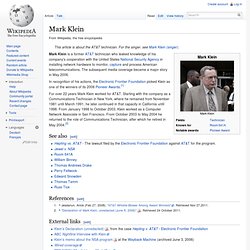
The subsequent media coverage became a major story in May 2006. In recognition of his actions, the Electronic Frontier Foundation picked Klein as one of the winners of its 2008 Pioneer Awards.[1] For over 22 years Mark Klein worked for AT&T. Starting with the company as a Communications Technician in New York, where he remained from November 1981 until March 1991, he later continued in that capacity in California until 1998.
From January 1998 to October 2003, Klein worked as a Computer Network Associate in San Francisco. See also[edit] References[edit] External links[edit] Thomas Andrews Drake. Thomas Andrews Drake (born 1957) is a former senior executive of the U.S.
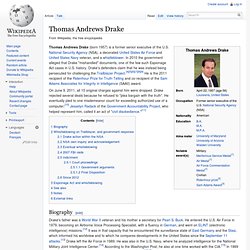
National Security Agency (NSA), a decorated United States Air Force and United States Navy veteran, and a whistleblower. In 2010 the government alleged that Drake "mishandled" documents, one of the few such Espionage Act cases in U.S. history. Drake's defenders claim that he was instead being persecuted for challenging the Trailblazer Project.[4][5][6][7][8][9] He is the 2011 recipient of the Ridenhour Prize for Truth-Telling and co-recipient of the Sam Adams Associates for Integrity in Intelligence (SAAII) award.
On June 9, 2011, all 10 original charges against him were dropped. Drake rejected several deals because he refused to "plea bargain with the truth". William Binney (U.S. intelligence official) William Edward Binney[2] is a former highly placed intelligence official with the United States National Security Agency (NSA)[3] turned whistleblower who resigned on October 31, 2001, after more than 30 years with the agency.
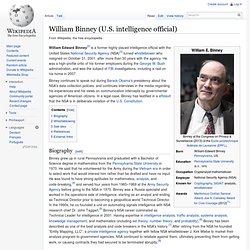
He was a high-profile critic of his former employers during the George W. Bush administration, and was the subject of FBI investigations, including a raid on his home in 2007. Binney continues to speak out during Barack Obama's presidency about the NSA's data collection policies, and continues interviews in the media regarding his experiences and his views on communication intercepts by governmental agencies of American citizens. In a legal case, Binney has testified in a affidavit that the NSA is in deliberate violation of the U.S.
Constitution.